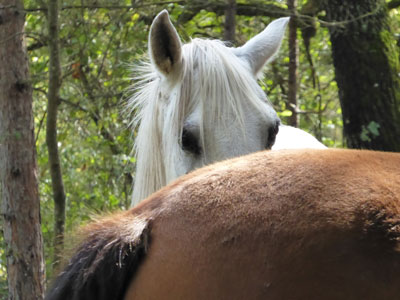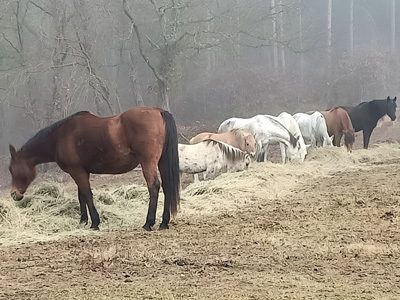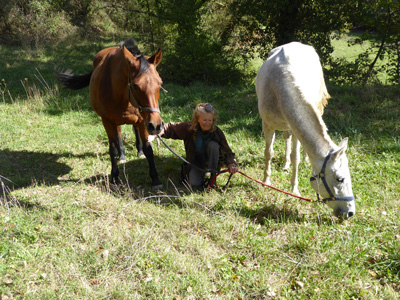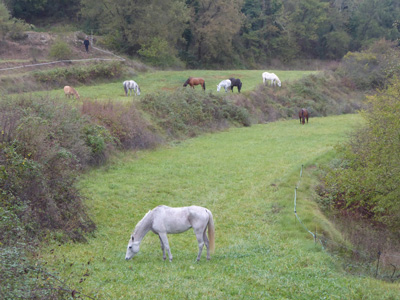Annual Report 2023
(Excerpt: For the complete report please write to Epona-Stiftung für Pferd und Umwelt c/o Mermagen, Kesselstr. 15, 53797 Lohmar)

Rain-heavy, dark clouds shade the dry pastures. Will it finally rain? It was a hot and dry summer, followed by an autumn without rain. The grass has been eaten away and withered. The dams are empty. We hope for rain and are always disappointed. A few drops may have fallen, but nothing that would put an end to the drought. Hay is becoming increasingly scarce and more expensive. We still found an affordable supply in France.
The horses are lined up along the long hay line. They eat peacefully head to head with their boyfriend or girlfriend, only the two new ones are standing a little apart. As long as there is enough for everyone, there is no argument. And at the Epona Foundation for Horses and the Environment there has always been enough for everyone, and that's how it will stay, that's what we work for and care about. Even if this is often not easy due to the increasingly noticeable climate changes.

Two new family members
Since we had to say goodbye to some of our four-legged friends in recent years, we were able to welcome new horses into the Epona family again in 2023. The two Arabian mares Romatika du Cade and Quelea Azureenne came to us on October 20th. To simplify things we call Romatika Tika and Quelea Lea. There are two endurance racehorses that were bred after their racing careers.
Lea was born on April 10, 2004. Her mother, Vannessia Azurrenne, had nine foals. Her father, Habdur, was a Polish Arab and had 52 sons and daughters. Lea was born in France, where she lived until 2013, when she came to Spain. She only took part in four races. In 2011 she was injured and was used for breeding. Two of her offspring became racehorses. If she hadn't been taken in by the Epona Foundation, she would probably continue to do laps around the world or would already be in a truck bound for a slaughterhouse, Mercè speculated. So, welcome Lea, with us you can enjoy your twilight years in peace and tranquility.
Tika was born on March 20, 2005 and has famous ancestors. Her father, Lammah al Alia, was one of the 335 sons and daughters of the famous French Arabian stallion Persik. Two of his descendants were world champions and many won endurance races around the world. At the age of 18 and 19, Persik won the race in Florac, in Cervennes, France, the most legendary endurance race in the world. A monument was erected to him in the town of Florac and until his death, he died very old, he lived with his mares in the Florac National Park. Tika was also born in France. Her mother, Shagya LV51, was a racehorse for eight years. Tika ran races for seven years. She also came to Spain in 2013, where she continued to train and take part in races until 2018. Then she came to breeding.
Before Tika and Lea came to us, they lived in a large herd of several hundred broodmares. They weren't special friends, but given our close-knit gang of seven (see also Annual Report 2022), Toby and Cookie, Triana and Titia, Freya and Lara and Lord, they bonded.


Bringing the horses together wasn't easy. After watching and sniffing each other over the fence for over a week, we thought it was a good time to open the passage, especially since Tika was in heat and Tobby was very interested. What a mistake! To escape from the “gang” they broke through the fences and we had to collect them again just before the village. It was only on the third attempt that we managed to bring them together. This was mainly thanks to a pasture where the grass grew lushly and was therefore more interesting than the others. Meanwhile, the sensitive Freya has teamed up with the sensitive Tika. Lea is still a bit aloof, but Tobby is often by her side.
Valentina died
On December 27th Valentina died. Since November she has had more pain again. When the podiatrist came at the beginning of the month, she didn't want to lift her right hoof so as not to put pressure on the left one. Then the right front leg began to swell. Even though her teeth were done and she was also dewormed, she lost weight. The cause, we were sure, was pain from her old injuries. We called the vet Jordi, who had treated her many times. He infiltrated medication and painkillers on November 30th, after which he briefly improved. On December 27th Valentina was not at Kosmos and Jumpy and Aloha. We looked for her everywhere and finally found her in completely impassable, sloping terrain on the other side of the river. She retreated there to die. Far away from the place where she always hung out with her friends. We couldn't rescue them there, and so nature took its course.


We are happy that Valentina is now free of her pain. She was with the Epona family for many years, often a bit apart. The former dressage horse always played a special role. When she came to us, we didn't know about her old injuries. Jordi only discovered this years later on an x-ray, where the calcifications were obvious. Thank you, Valentina, for your patience.
Kosmos mourns
Valentina's death affected Kosmos the most. He mourned for weeks, didn't want to eat properly, lost weight, and looked at us sadly. Where is she? He seemed to keep asking. We kept telling him that she had died, but he didn't want to believe it. It was only after more than two months that he slowly gave in and seemed to accept that she would never come back. Jumpy and Aloha obviously took the loss of their friend rather calmly.
Jumpy is unchanged. Changing his coat is always difficult for him. After the dentist Matilde had done his teeth, he ate his soaked hay beans with greater appetite and also gained some weight. When it rains, Aloha goes into a dry, littered shelter where she can see the others. We have your hoof disease under control very well.


Freya is becoming more and more trusting and prefers to be petted all day long. In Tika she has found an equal, sensitive and shy. Titia and Triana have grown into beautiful horses that are trusting and less and less afraid. Even the cows in the neighboring pasture now barely let them raise their heads. Lara is still the leader and inseparable from her friend Lord. Cookie is increasingly getting older and therefore more trusting. He now knows that we mean him no harm. Tobby still thinks that he is a great thoroughbred stallion, and he behaved accordingly with the two new mares. They belong to me, he made it clear to everyone from the start. Lord just said, OK, and turned back to his true love, Lara, and Cookie didn't care anyway. The main thing is that he has peace and quiet.
It starts to rain and the first green sprouts appear on the pastures. Soon there will be a change and a new pasture with fresh green awaits the Epona horses.
Projeto Uerê
Annie Hasemanns (volunteer in Projeto Uerê, e-mail: annie.hasemanns@gmail.com) was in Rio de Janeiro in November 2023 and was with the Uerê children in the Favela Complexo da Maré every day. During her visit we had a Skype conference with her, Yvonne, Luciana and Lliane. The founder and boss of Uerê, Yvonne Bezerra de Mello, thanked the Epona Foundation for its years of support. From 2024, the Epona Foundation will support a child again. In 2023, the Epona Foundation supported Uerê in restoring the computer room. The ceiling had collapsed. Thank God there was no one in the room and so there was only material damage, which had to be repaired quickly so that the children could be taught there again.
Annie Hasemanns wrote a report about her visit:
In 2023, some public schools began introducing full-day classes, meaning children are taught from morning to early afternoon. The private schools, on the other hand, maintained the usual rhythm. In Projeto Uerê there are therefore fewer lessons in the morning and more lessons from 3 p.m. to 6 p.m. In the morning, literacy classes and extracurricular activities (computers, art, music) take place primarily. Liliane takes care of purchasing food, training materials and other necessary items for the project. The accounting is carried out by Luciana Martha and external auditors. Yvonne takes care of the general direction of the project, contact with international sponsors and teaches 16 to 18 year olds. She plans to retire in four years (when she turns 80). But the staff is well trained and prepared. Most of them have been working at Projeto Uerê for many years and know by heart all the routines and special teaching methods to help children with learning difficulties and behavioral problems.
The slum looked even poorer than before the pandemic. Many people had lost their jobs. Some could no longer pay their rent and families ended up living with relatives or on the streets (in Rio de Janeiro the number of street dwellers and beggars has increased dramatically). Garbage collection is irregular and public buildings, such as schools, are poorly maintained. Power outages and a lack of water supply occur again and again in the slums. In 2023, 42 schools were closed on more than 30 days due to armed clashes between rival drug gangs or large operations by military police in municipalities. This means the children had no lessons. Basic medical care facilities also had to be closed for 20 days. During these violent clashes, everyday life in the favela is severely disrupted. People cannot leave their homes to go to work, local shops are closed and all services suspended. Uerê also had to close for 29 days. There seems to be no solution for ordinary people who just want to work and get their children safely to the nearest school or let them play outside.


But there is also good news.
One of my concerns when visiting the project was to analyze how the Uerê children progress after completing secondary school. That's why I spoke to former Uerê youth. I was happily surprised to see that there are differences from seven to ten years ago.
Back then, children barely completed nine years of schooling, and completing secondary school was the icing on the cake. Today, this is usually followed by a successful entrance exam. Getting into university is not easy, especially for young people from poor neighborhoods (with significantly less general education). The Uerê children appear to be better prepared to move to the next level. Most of those who pass secondary school also manage to gain admission to university or other further education institutions. This is a significant development and proof that Projetos Uerê's teaching methods are valuable and sustainable.
The former Epona Foundation scholarship child, Thalita, also passed the university entrance exam in January 2024 and is starting to study nutrition.